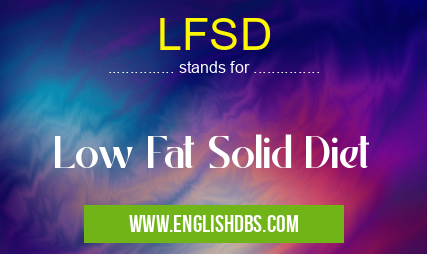What does LFSD mean in FOOD & NUTRITION
LFSD stands for Low Fat Solid Diet. It is a type of diet that restricts the intake of fat, especially saturated fat and cholesterol. This diet is often recommended for people with certain health conditions, such as heart disease, high cholesterol, or diabetes.

LFSD meaning in Food & Nutrition in Miscellaneous
LFSD mostly used in an acronym Food & Nutrition in Category Miscellaneous that means Low Fat Solid Diet
Shorthand: LFSD,
Full Form: Low Fat Solid Diet
For more information of "Low Fat Solid Diet", see the section below.
What does LFSD mean?
- Low: The diet is low in fat, especially saturated fat and cholesterol.
- Fat: The diet restricts the intake of fat.
- Solid: The diet consists of solid foods, such as fruits, vegetables, and lean protein.
- Diet: The diet is a specific plan for eating that is followed for a period of time.
LFSD foods to avoid
- Fatty meats: bacon, sausage, ribs, marbled steaks
- Processed meats: hot dogs, bologna, salami, ham
- Fried foods: french fries, onion rings, fried chicken
- High-fat dairy products: whole milk, cream, butter, cheese
- Eggs: whole eggs contain high cholesterol
- Lard
- Coconut oil
- Palm oil
LFSD foods to eat
- Fruits: apples, bananas, berries, oranges, grapes
- Vegetables: broccoli, carrots, celery, cucumbers, tomatoes
- Lean protein: chicken breast, fish, beans, tofu
- Low-fat dairy products: skim milk, nonfat yogurt, low-fat cheese
- Whole grains: brown rice, quinoa, oats, whole-wheat bread
- Healthy fats: olive oil, avocado, nuts, seeds
Conclusion
The LFSD is a type of diet that restricts the intake of fat, especially saturated fat and cholesterol. This diet is often recommended for people with certain health conditions, such as heart disease, high cholesterol, or diabetes. By following an LFSD, individuals can improve their overall health and well-being.
Essential Questions and Answers on Low Fat Solid Diet in "MISCELLANEOUS»FOOD"
What is the Low Fat Solid Diet (LFSD)?
The Low Fat Solid Diet (LFSD) is a type of restrictive diet that limits fat intake to less than 10% of total calories. It is typically used in the management of conditions such as pancreatitis, gallbladder disease, and malabsorption disorders.
What are the benefits of the LFSD?
The LFSD can help reduce pain and inflammation in conditions like pancreatitis and gallbladder disease. It can also improve digestion and absorption of nutrients in malabsorption disorders.
What foods are allowed on the LFSD?
The LFSD includes low-fat foods such as:
- Lean meats (chicken, turkey, fish)
- Low-fat dairy products (skim milk, yogurt, cheese)
- Fruits and vegetables
- Whole grains (brown rice, oatmeal, quinoa)
- Fat-free broths and soups
What foods are restricted on the LFSD?
The LFSD restricts foods high in fat, such as:
- Fatty meats (beef, pork, lamb)
- Full-fat dairy products (whole milk, cream, cheese)
- Fried foods
- Processed meats
- Sugary drinks
How long should I follow the LFSD?
The duration of the LFSD varies depending on the underlying condition. For acute pancreatitis, the LFSD is typically followed for 1-2 weeks. For chronic pancreatitis, it may be recommended for a longer period. Your healthcare provider will provide specific guidance based on your individual situation.
Are there any side effects of the LFSD?
Side effects of the LFSD may include:
- Constipation
- Diarrhea
- Bloating
- Gas
- Fatigue
Is the LFSD safe for everyone?
The LFSD may not be suitable for everyone. Individuals with certain underlying health conditions, such as kidney disease or malnutrition, should consult with their healthcare provider before starting the LFSD.
